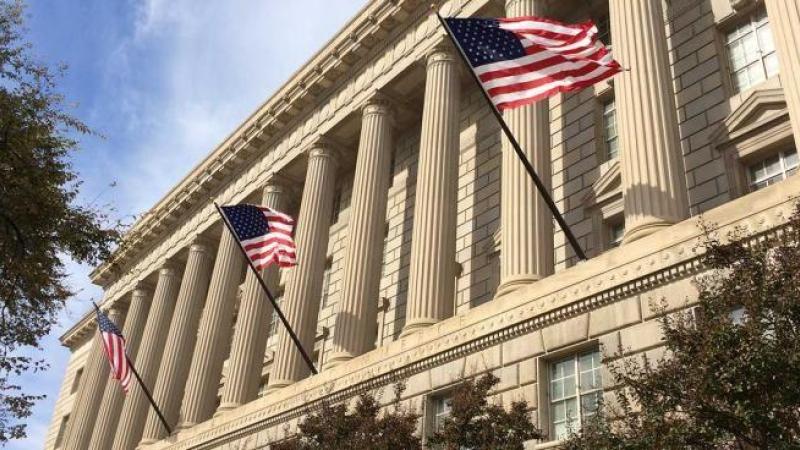Americans feeling pain of housing crisis as millions fear eviction under Bidenomics
Essential costs of living — food and shelter — are skyrocketing for Americans as their real wages are going down.
Americans are finding it increasingly difficult to afford rent or mortgage payments as housing costs continue to soar, spotlighting a broader trend of inflation making the most basic and fundamental costs of living exceedingly high for working people.
Shelter costs, which include rents and various other housing-related expenses, rose 0.7% in August from the prior month — the biggest monthly increase since 1991 — and skyrocketed by 6.2% compared to this time last year, according to data released this week by the Bureau of Labor Statistics.
Meanwhile, mortgage rates on Thursday surged above 6% for the first time since the housing crash of 2008. The 30-year fixed rate stood at 2.86% a year ago and at 2.65% in January 2021, when President Biden entered office and former President Trump was leaving the White House.
"This has raised interest payments on a 30-year mortgage for a $500,000 house by about $200,000 over the life of the loan," economist Stephen Moore wrote in a newsletter this week sent out by the Committee to Unleash Prosperity. "That doesn't help home sellers or buyers."
Housing has also become more expensive for those renting their homes.
The rent index by itself rose by 0.7% from July to August and was up 6.7% from a year ago, according to the latest data from the Bureau of Labor Statistics.
According to data from Zillow, the typical U.S. monthly rent in August was about $2,090, a 12.3% increase from a year earlier. By comparison, average U.S. rent was $1,660 in February 2020, right before the COVID-19 pandemic.
While the rent surge is still well above the historical average, the pace of growth is slowing from where it was earlier this year.
With rent hikes adversely affecting millions of Americans, 8.5 million people were behind on their rent at the end of August, and 3.8 million of those renters say they're somewhat or very likely to be evicted in the next two months, according to data from the Census Bureau.
One city that has been hit particularly hard by this trend is Phoenix, Ariz., where rent skyrocketed by 21% over the last year. And earlier this year, Phoenix led the nation in home price growth, at one point hitting a 33% year-over-year gain. Increases have slowed in recent months, but they've taken their toll.
"We're finding out here in Arizona and Phoenix, it's rent prices and housing prices" driving inflation, Arizona Republican gubernatorial candidate Kari Lake told the "Just the News, Not Noise" television show this week. "As so many people flee these blue states, which are being run into the ground by Democrats, they're coming to Arizona. They're nabbing up our housing and driving the prices up, and it's almost becoming impossible to find affordable housing.
"So, we need to quickly build more housing here in Arizona, and we've got a plan in place when I'm governor to make that happen. We want to have enough homes for our citizens."
According to experts who spoke to Just the News, many factors contributing to the current housing situation have existed for decades. But what's different now, they say, is historically high inflation due to government spending.
"The U.S. housing crisis is fundamentally driven by a lack of supply," said Thomas Wade, director of financial services policy at the American Action Forum. "In order to meet today's demand, we would need to increase the number of homes available to purchase or rent (known as housing inventory) by about 1.5 million units.
"The creation of this many homes is likely impossible and, even if it were possible, would take decades and a fundamental rewrite of zoning laws, land management, and other bureaucratic barriers to construction. This housing shortfall has existed for decades, but what is new is the historic levels of inflation the economy is seeing as a result of heavy congressional spending."
Inflation, which reached a four-decade high earlier this year, rose more than economists expected in August, with consumer prices increasing 0.1% from the prior month, according to the Bureau of Labor Statistics.
The price surge came despite a 10.6% drop in gas prices, which had been on the rise and a chief contributor to inflation for most of the year. The high cost of shelter helped offset lower gas prices.
Cost increases related to housing account for about 30% of consumer inflation tracked by the Labor Department.
"The housing market is therefore a particular focus of the Federal Reserve as it seeks to combat inflation," said Wade. "By raising rates (including mortgage rates), the cost to borrow to finance a home will increase. While painful for prospective homeowners (as Fed Chair Jerome Powell acknowledged) this is precisely what the Fed is seeking to achieve. If demand decreases for housing, fewer people will chase the same limited number of homes, and house prices will eventually fall in line with the decrease in demand.
"Whether the Fed can engineer a fall in house prices without triggering a recession remains to be seen. And in the very short term, the U.S. housing market is experiencing as hostile an environment as it is possible to create — high mortgage prices, too few homes, and prices that have yet to fall significantly."
Experts have cited Biden's economic policies — including massive, Democrat-backed government spending — and the Federal reserve keeping interest rates near zero until recently as key causes of higher prices.
Beyond housing, sharp surges in food prices also contributed to last month's unexpected increase in inflation.
The latest government data showed food costs spiked 11.4% over the past year, the largest annual increase since May 1979.
Specifically, restaurant menu prices increased 8%, and grocery prices surged 13.5%.
In other words, arguably the two most basic and essential costs of living — food and shelter — are skyrocketing for Americans.
Adding to the problem, paychecks are not keeping pace with rising prices. This week, the Labor Department said real average weekly earnings decreased 3.4% over the last 12 months.
A key effect of lower real wages is reduced ability to buy goods and services — and to make a rent or mortgage payments.
Moore told Just the News last month that the Committee to Unleash Prosperity, which he founded, estimated that purchasing power of a median income household family was down about $4,000 over the past 14 months.
A recent report by the American Consumer Institute's Center for Citizen Research reached a similar conclusion.
"The combination of increased spending, energy shortages, and increased regulations have led to increases in inflation that have far outpaced wage increases," said the report. "Based on our analysis and those of others, consumers are likely to lose thousands of dollars this year alone — by one measure, $4,400 per household in 2022 — disproportionately hurting poorer Americans and those on fixed incomes."
Since Biden took office, real average weekly earnings have declined more than 5% and, according to some estimates, equate to real earnings dropping an annualized $3,000 for the average American.
University of Chicago economist Case Mulligan has calculated that the Inflation Reduction Act, the Democrat- and Biden-backed tax and spending bill signed into law last month, will cause average household incomes to fall by roughly $1,200 over the next decade.
"Congress has remarkably few policy levers available to alleviate the economic burden available to homeowners and renters," according to Wade, who argued long-term policies should revolve around incentivizing new construction and reforming the secondary mortgage market, which is dominated by government-sponsored enterprises Fannie Mae and Freddie Mac.
"The problem is that these supply-side solutions are difficult and will take a long time, neither of which is attractive to Congress," he continued. "Instead, congressional Democrats are eager to seize the only policy tools they have available to them in the form of demand-side subsidies. Although this may take a variety of forms, from housing vouchers to rental assistance, at the end of the day it boils down simply to giving homeowners and renters money."
While these measures may help certain populations in the short term, they will inevitably lead to a further increase in demand, Wade explained.
"As the government artificially makes more cash available to compete over the same number of homes, prices will inevitably rise," he said. "Not only do higher home and rental prices necessarily harm vulnerable populations the most (meaning that many of these demand-side policies actively harm those that they are trying to help), but by increasing the amount of cash in the system, Congress risks actually undoing the painful work at the Fed to combat inflation. In the worst case, inflation will persist even longer, prove harder for the Fed to combat, and increase the risks of the Fed triggering a real recession."
















